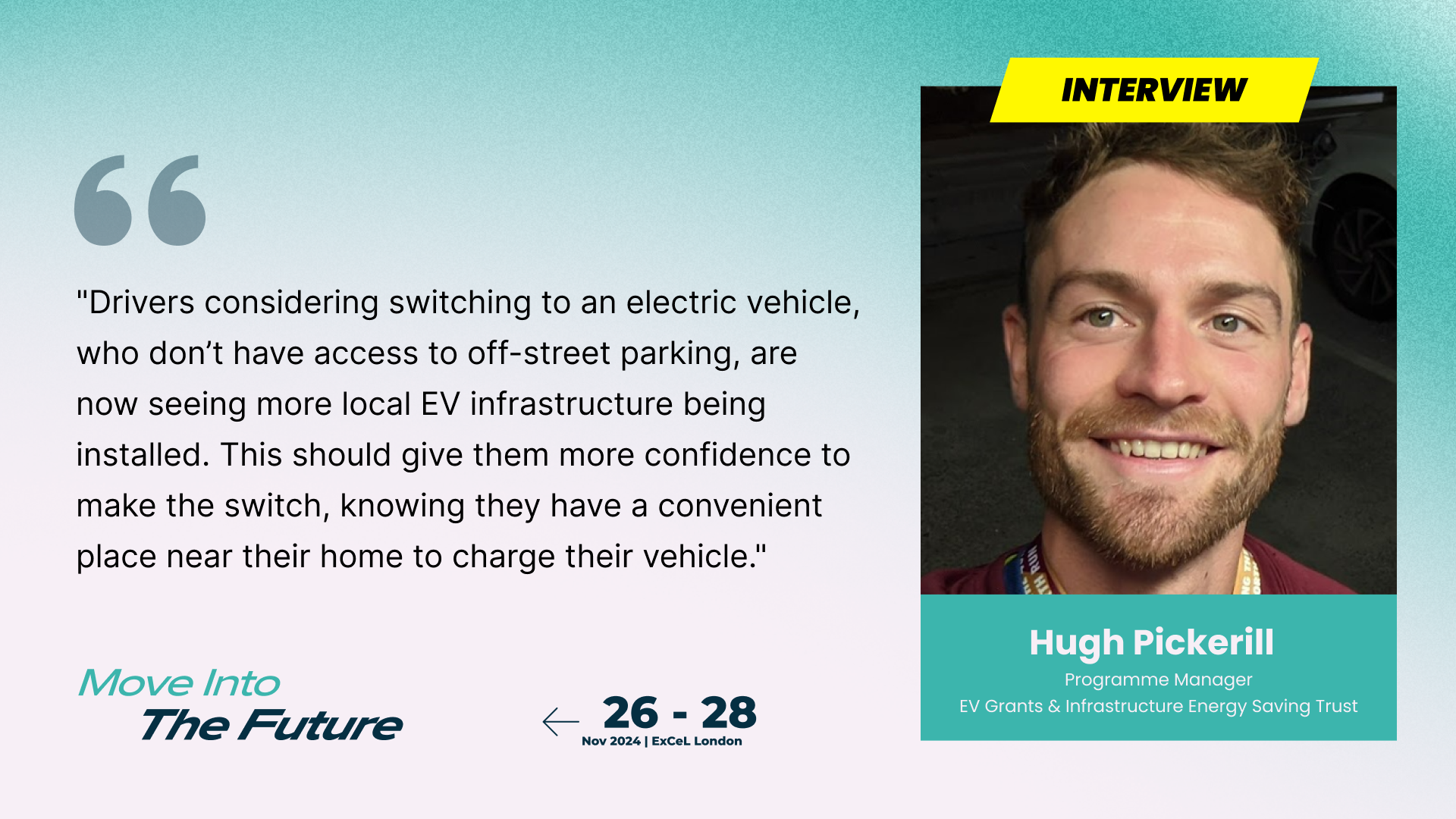We are delighted to present a Q&A session with Hugh Pickerill, Programme Manager for EV Grants & Infrastructure at the Energy Saving Trust. With extensive experience coordinating the LEVI and ORCS schemes on behalf of the Office for Zero Emission Vehicles (OZEV), Hugh has played a pivotal role in scaling electric vehicle infrastructure across the UK. His insights will offer a deep dive into the progress, challenges, and future plans for expanding EV infrastructure, with a focus on ensuring accessibility and equity. Attendees can expect to learn about key projects, collaborative strategies, and the path forward for sustainable transport solutions.
#LEVS: How has the Local Electric Vehicle Infrastructure (LEVI) scheme contributed to the expansion of charging infrastructure in the UK, and what successes have you seen in its implementation so far?
#Hugh Pickerill: I’ve seen significant progress in the rollout of chargepoints and the development of the electric vehicle chargepoint sector since I started working on the LEVI scheme in 2022. Following successful applications to the LEVI Pilot funding in 2022 and 2023, 25 local authorities are in the process of delivering more than 3,400 chargepoints. Energy Saving Trust are now working to administer £343 million central public funding through the LEVI capital fund. This will leverage a greater proportion of private sector investment, enabling local authorities to install primarily low-powered chargepoints at scale nationwide.
The LEVI capability fund also focuses on enabling local authorities to put adequate resources behind successfully designing and implementing large scale chargepoint projects. This focus has meant that 240 local authority officers are now in post working on electric vehicle infrastructure (EVI) related projects.
In addition to providing funding support to local authorities, the LEVI Support Body (Energy Saving Trust, Cenex, and PA Consulting) has worked closely with the Office for Zero Emission Vehicles (OZEV) to deliver bespoke resources, training and guidance to support the industry in achieving exciting and ambitious chargepoint network targets.
#LEVS: What role does the On-street Residential Chargepoint Scheme (ORCS) play in supporting urban areas with limited private parking, and how does it help drive EV adoption among residents?
#Hugh Pickerill: Energy Saving Trust has administered the ORCS since 2017-2018. Over time, it has evolved from a relatively small grant scheme to one that has delivered more than 10,000 chargepoints across the UK, with several thousand more in the delivery pipeline from ongoing projects.
I think that drivers considering switching to an electric vehicle, who don’t have access to off-street parking, are now seeing more local EV infrastructure being installed. This should give them more confidence to make the switch, knowing they have a convenient place near their home to charge their vehicle.
#LEVS: How does Energy Saving Trust work with local governments and businesses to ensure that the transition to EV infrastructure supports a wider strategy for clean energy and low-carbon transport?
#Hugh Pickerill: Energy Saving Trust has 30 years’ experience working with the public sector, governments, businesses, consumers and communities across the UK to save energy, reduce carbon emissions and accelerate the transition to net zero. In terms of transport, our advice reaches local authorities and businesses across the UK.
We manage UK Government grant transport grants and loans and offer advice for fleets, freight and retrofit, taxis and private hire, community travel, efficient driving and electric car and van usage.
One of our key values is collaboration. Across our transport team we work collectively to ensure that all our different workstreams contribute to the wider goal of decarbonising the UK transport sector.
#LEVS: What do you see as the most important next steps in expanding EV charging accessibility across diverse communities, ensuring that the shift to EVs is inclusive and equitable for all?
#Hugh Pickerill: Engaging with the community is a hugely important part of deploying EV infrastructure in a local area. Local authorities are best positioned to understand their residents’ needs and regularly engaging with them on their requirements for their local charging network is essential.
We’re supporting local authorities to do this through the Department for Transport funded, Local Government Support Programme (LGSP), through which we run regular webinars on making EV infrastructure accessible.
Given the scale of our work in supporting the government to expand the charging network across the country, it’s important that we continue to provide advice and ensure that we are as inclusive as possible.
#LEVS: How do events like the London EV Show contribute to raising awareness and driving collaboration around EV infrastructure development, and what impact do they have on accelerating the transition to sustainable transport solutions in the UK?
#Hugh Pickerill: Industry events play an important role in engagement, education and collaboration within the sector. Engagement is vital in this industry and as we learn new things every day, it’s important for events like these to continue.


